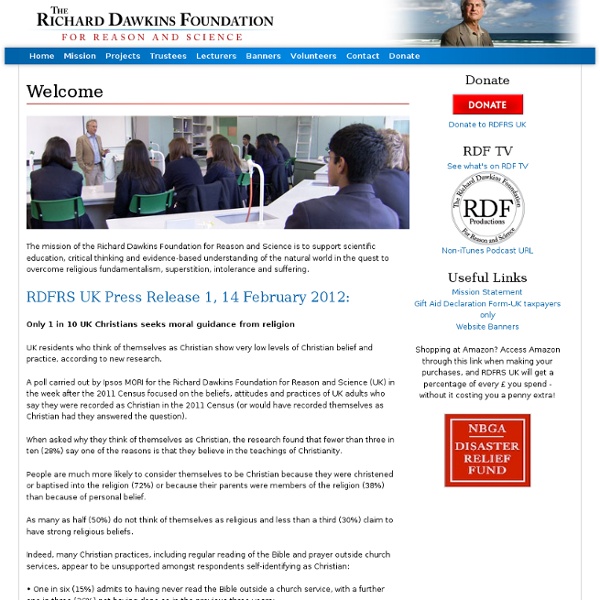



The Lawyer's Amoral Ethical Role: A Defense, a Problem, and Some Possibilities by Stephen Pepper University of Denver College of Law1986 American Bar Foundation Research Journal, pp. 613-635, 1986 Abstract: This essay presents a moral justification for the current generally accepted amoral ethical role of the lawyer. The justification is premised primarily upon the values of individual autonomy, equality, and diversity. Number of Pages in PDF File: 25 Accepted Paper Series Suggested Citation Pepper, Stephen, The Lawyer's Amoral Ethical Role: A Defense, a Problem, and Some Possibilities (1986).
The Skeptics Society & Skeptic magazine Population Matters » For a sustainable future Atheism as Lacking a Moral Foundation On the issue of reclaiming moral language - the sixth component of Sean Faircloth's new political strategy for atheists - atheists should learn to react to the claims that they lack a moral foundation the way Jews react to the phrase "Christ killers." We react as if it is a mere intellectual error - requiring a rebuttal in terms of reason and evidence. However, it is more than that. Like the term "Christ killers" it is politically and socially useful. When people make certain mistakes, we have reason to ask why they make those mistakes and not some other. Religion is mostly make-believe. They could have adopted a fiction in which the universe contains certain moral truths built into it by God, but which are available to everybody. Using this fiction, atheists and theists may disagree on the fundamental origin of the relevant type of laws. Of course, a theist may object to some of the premises in this argument - particularly the premise that religion is mostly make-believe.
| The Odds Must Be Crazy Jared Diamond: It’s irrational to be religious Virtually all religions hold some supernatural beliefs specific to that religion. That is, a religion’s adherents firmly hold beliefs that conflict with and cannot be confirmed by our experience of the natural world, and that appear implausible to people other than the adherents of that particular religion. For example, Hindus believe there is a monkey god who travels thousands of kilometers at a single somersault. No other feature of religion creates a bigger divide between religious believers and modern secular people, to whom it staggers the imagination that anyone could entertain such beliefs. One suggested answer is that supernatural religious beliefs are just ignorant superstitions similar to supernatural non-religious beliefs, illustrating only that the human brain is capable of deceiving itself into believing anything. Perhaps, then, religious superstitions are just further evidence of human fallibility, like belief in black cats and other non-religious superstitions.
Skepticality » The Official Podcast of Skeptic Magazine Most Theories of Consciousness Are Worse Than Wrong According to medieval medicine, laziness is caused by a build-up of phlegm in the body. The reason? Phlegm is a viscous substance. The phlegm theory has more problems than just a few factual errors. In the modern age we can chuckle over medieval naiveté, but we often suffer from similar conceptual confusions. One corner of science where phlegm theories proliferate is the cognitive neuroscience of consciousness. The oscillation theory of consciousness became popular in neuroscience in the 1990s and still has its adherents. Neuronal oscillations probably do play an important role in the flow of information in the brain, although the exact role is debated. Most people have a set of intuitions about consciousness. But the theory provides no mechanism that connects neuronal oscillations in the brain to a person being able to say, “Hey, I have a conscious experience!” Another popular explanation of consciousness is the integrated information theory. Again, it flatters intuition.